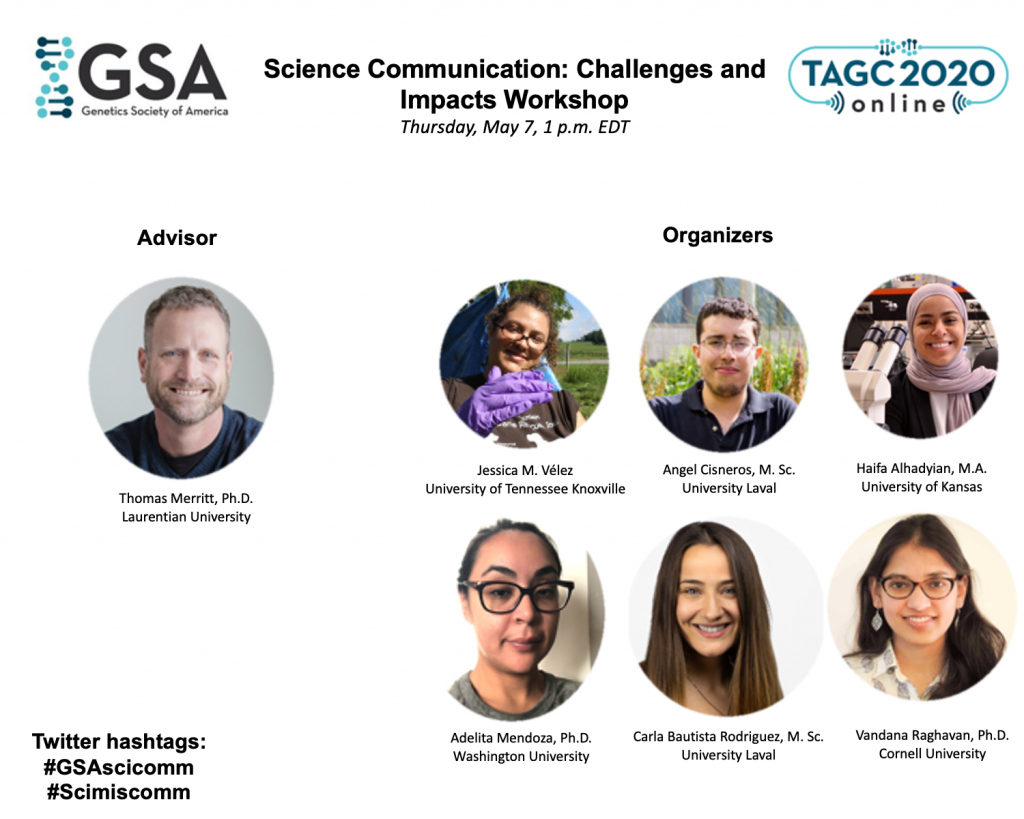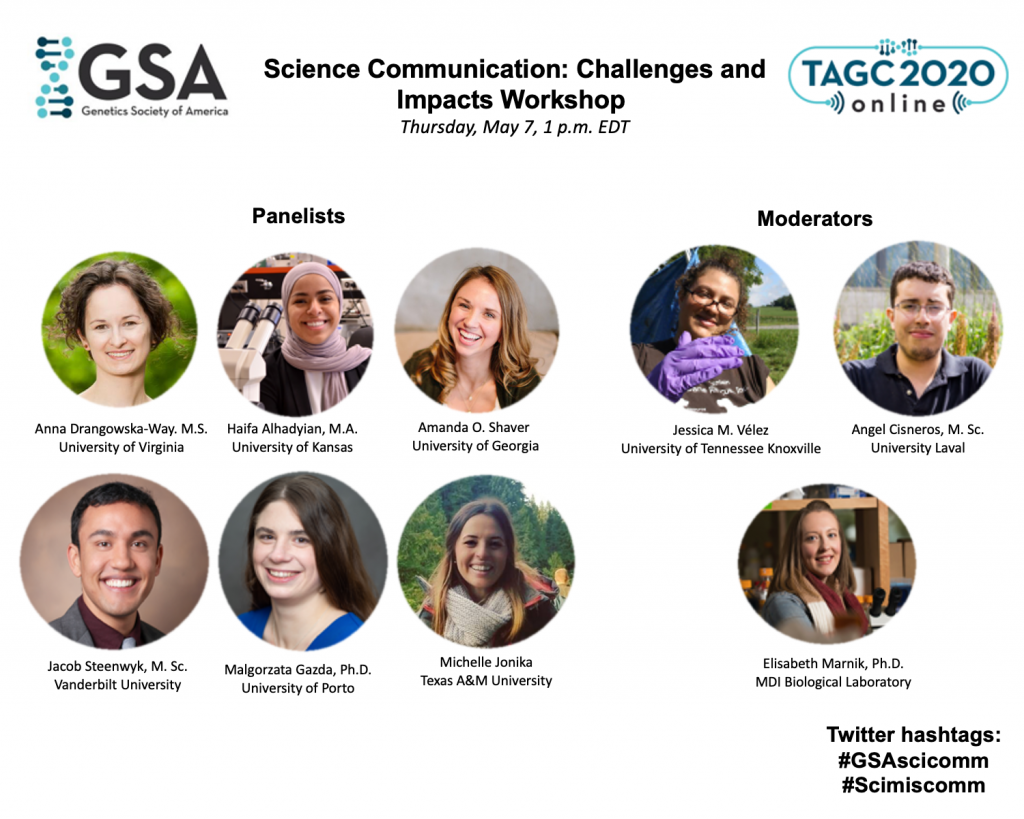In late 2019, Thomas Merritt approached the members of the Communication & Outreach Subcommittee of the GSA Early Career Leadership Program about submitting a proposal for The Allied Genetics Conference (TAGC) 2020. The members of the subcommittee jumped at the opportunity, and a group of six submitted a full proposal, which the Genetics Society of America accepted for an in-person workshop.

Then, COVID-19 happened, and GSA made the difficult choice to cancel the in-person conference. However, a few weeks later GSA announced that TAGC 2020 was pivoting to a fully virtual format. The conference would now have free registration, and each accepted workshop was offered a virtual workshop spot using Zoom.
Once again, the Communication and Outreach Subcommittee team jumped at the new opportunity to showcase science communication and outreach to a virtual audience. We met weekly to discuss the new format and were thrilled to contact representatives from other Early Career Scientist Subcommittees, who graciously volunteered their time to serve as panelists. In addition to Communication and Outreach Subcommittee members, Amanda Shaver and Michelle Jonika joined us from the Career Development Subcommittee, and Malgorzata (Gosia) Gazda joined us from the Steering Subcommittee.

The Science Communication: Challenges and Impact Workshop was the first featured workshop at The Allied Genetics Conference Online 2020. Our objective was to provide a diverse group of panelists who could discuss their specific experiences in science communication and outreach, as well as provide a space for scientists to discuss different approaches to science communication.
The workshop consisted of three parts: a panel discussion, an activity with the participants, and a Q&A session. Our panelists opened the workshop by sharing their experiences with diverse platforms for science communication. While our panelists spoke, our participants engaged in a lively discussion using the Zoom chat feature to share their own recommendations, experiences, Twitter handles, and countries of origin. Some of our participants also live-tweeted the event using the #GSASciComm hashtag, and our co-moderators engaged with these Twitter conversations live during the workshop.
After each panelist spoke about their experiences, we split the participants into breakout rooms with one panelist as the room moderator for a guided activity. Participants were provided with an excerpt from a scientific paper prior to the workshop for this activity, and spent 15 minutes discussing how to explain the excerpt to broader audiences.
Excerpt:
“We then found that a short region of RNA-dependent RNA polymerase (RdRp) from a bat coronavirus (BatCoV RaTG13)—which was previously detected in Rhinolophus affinis from Yunnan province—showed high sequence identity to 2019-nCoV. We carried out full-length sequencing on this RNA sample (GISAID accession number EPI_ISL_402131). Simplot analysis showed that 2019-nCoV was highly similar throughout the genome to RaTG13 (Fig. 1c), with an overall genome sequence identity of 96.2%. Using the aligned genome sequences of 2019-nCoV, RaTG13, SARS-CoV and previously reported bat SARSr-CoVs, no evidence for recombination events was detected in the genome of 2019-nCoV. Phylogenetic analysis of the full-length genome and the gene sequences of RdRp and spike (S) showed that—for all sequences—RaTG13 is the closest relative of 2019-nCoV and they form a distinct lineage from other SARSr-CoVs (Fig. 1d and Extended Data Fig. 2).”
Reference: Zhou, et al., 2020. Nature.
Finally, we began the Q&A session with questions that our participants submitted during registration, then opened the floor for other questions from the participants.
We are proud to report that the workshop was a great success! We brought together a total of 70 highly motivated participants from at least 15 different countries. Our participants eagerly engaged in the discussion by asking questions and sharing their own experiences, which continued on Twitter with the #GSASciComm hashtag. In fact, there was so much to discuss that the workshop extended for an hour longer than originally planned!
There are definitely improvements we would like to make for next time—and we would love for there to be a next time! Participants submitted valuable feedback and we will incorporate several of these suggestions in future plans and proposals, including longer breakout sessions (in a virtual format) and possibly including other languages in our breakout room sessions.
Survey testimonials
“I really appreciated hearing how the panelists got started in science communication and hearing about all the different resources available (virtually none of which I’d heard of before).”
“The ‘face-to-face”’ of the break-out session was really nice. To actually have conversations with people ‘at a conference’ was really awesome, especially given the current climate.”
“Thanks to the organizers and panelists for this event! Planning a panel in a limited time during physical distancing is very challenging (since I am also involved in planning career development panels in my university). It was a well-planned and motivating panel. Sharing your experience was very valuable during these times. I would love to hear more about further workshops or journal clubs.”
“This was a great group of organizers and panelists that energized and inspired the participants.”
Check out the Communication and Outreach subcommittee’s SciComm Resource Guide.
Engage with us on Twitter using the #GSASciComm hashtag.












